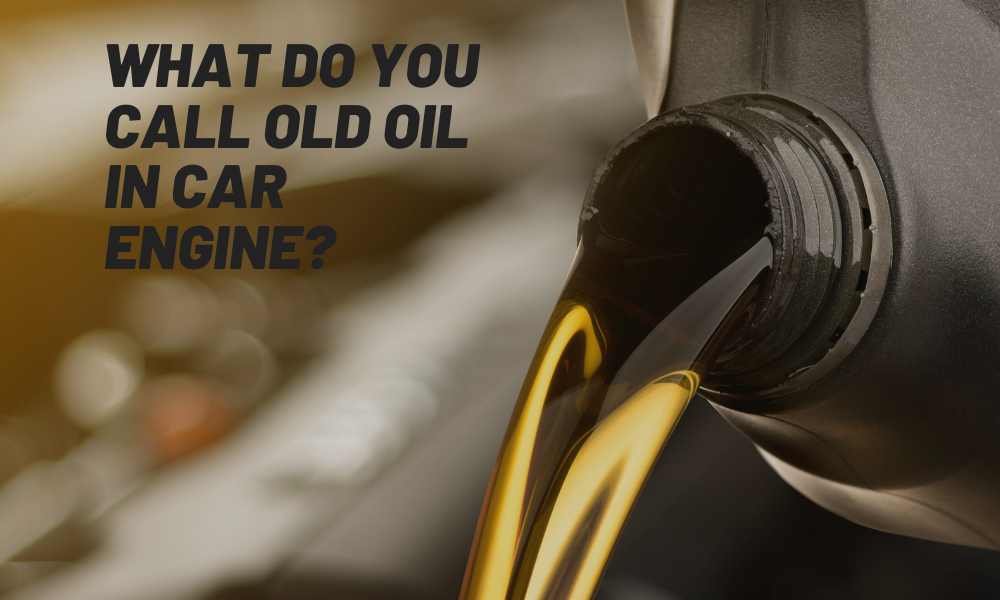When discussing vehicle maintenance, one critical aspect that often goes unnoticed is old oil in a car engine. But what do you call old oil in a car engine? The term commonly used by mechanics and automotive experts is “engine sludge.” Engine sludge is a thick, tar-like substance that forms when motor oil breaks down over time due to heat, contaminants, and lack of regular oil changes. It’s a hidden menace that can wreak havoc on your engine if left unchecked.
In this article, we’ll explore what engine sludge is, its causes, the potential damage it can cause, and the steps you can take to prevent and address this issue.
What Do You Call Old Oil in a Car Engine? A Deeper Look at Engine Sludge
Engine sludge, or old oil residue, is the result of motor oil losing its lubricating properties and turning into a thick, sticky substance. This typically happens when oil is not changed regularly, leading to a buildup of contaminants like dirt, soot, and fuel. Over time, this accumulation thickens and adheres to engine components, significantly reducing their efficiency.
Mechanics often encounter sludge during inspections or repairs and can identify it by its dark, tar-like appearance and unpleasant smell. Addressing it early is crucial to avoid expensive repairs and engine damage.
What Causes Engine Sludge?
Understanding the causes of engine sludge can help you take preventative measures to protect your vehicle. Here are the primary factors contributing to the formation of sludge:
- Irregular Oil Changes One of the main reasons sludge forms is neglecting regular oil changes. Over time, oil degrades, losing its ability to lubricate and protect engine components.
- Poor-Quality Oil Using low-quality or incorrect oil for your vehicle can accelerate oil breakdown. Always consult your vehicle’s manual to determine the recommended oil type.
- Frequent Short Trips Short trips don’t allow the engine to reach its optimal operating temperature, leading to incomplete combustion and an increase in contaminants within the oil.
- Neglected Maintenance Ignoring routine maintenance tasks such as replacing air filters and spark plugs can lead to dirt and debris entering the engine, further contributing to sludge formation.
- Engine Overheating Excessive heat can cause oil to oxidize and thicken, making it more likely to form sludge.
Signs of Engine Sludge in Your Car
Recognizing the signs of engine sludge can help you take prompt action before serious damage occurs. Here are some common indicators:
- Reduced Engine Performance: A sluggish engine or a decrease in fuel efficiency could indicate sludge buildup.
- Illuminated Oil Warning Light: This could be a sign that oil flow is restricted due to sludge.
- Unusual Noises: Knocking or ticking noises from the engine may result from inadequate lubrication caused by sludge.
- Visible Sludge Under the Oil Cap: If you remove the oil cap and notice thick, dark deposits, it’s a clear sign of sludge.
How Does Engine Sludge Affect Your Car?
Engine sludge can have several detrimental effects on your vehicle, including:
- Restricted Oil Flow Sludge can clog oil passages, restricting oil flow to critical engine components and causing wear and tear.
- Increased Engine Wear Without proper lubrication, engine parts experience increased friction, leading to accelerated wear and potential failure.
- Overheating Sludge can block the oil cooler, reducing its ability to regulate engine temperature, resulting in overheating.
- Reduced Lifespan of Engine Components Prolonged sludge presence can cause irreversible damage to components like the camshaft, crankshaft, and valves.
- Expensive Repairs If sludge buildup is severe, it may require a complete engine overhaul or replacement, both of which are costly.
How to Prevent Engine Sludge
Preventing engine sludge is easier and more cost-effective than dealing with its consequences. Here are some practical tips to keep your engine clean:
- Regular Oil Changes Follow your vehicle manufacturer’s recommendations for oil change intervals. Using high-quality synthetic oil can also help reduce sludge formation.
- Use the Right Oil Always use the type and grade of oil specified in your owner’s manual. High-mileage engines may benefit from specially formulated oils designed to prevent sludge.
- Maintain Your Vehicle Routine maintenance, including replacing air filters and spark plugs, ensures your engine stays clean and efficient.
- Avoid Short Trips Combine errands into a single trip to allow your engine to reach its optimal operating temperature, reducing sludge risk.
- Monitor Engine Performance Pay attention to warning lights and unusual engine noises, as they could indicate early signs of sludge.
How to Remove Engine Sludge
If your engine already has sludge, it’s essential to address the issue promptly. Here are the steps involved in removing sludge:
- Oil Change with Engine Flush An engine flush involves adding a cleaning solution to the oil system before an oil change. This helps dissolve sludge and flush it out with the old oil.
- Manual Cleaning In severe cases, a mechanic may need to manually clean engine components to remove sludge deposits.
- Replace Oil Filters Replacing the oil filter ensures that any remaining sludge or contaminants are trapped, preventing further circulation.
- Inspect and Repair Damage Have a professional inspect the engine for damage caused by sludge and address any necessary repairs.
The Importance of Timely Action
Neglecting engine sludge can lead to catastrophic engine failure. Addressing the issue promptly not only saves you money but also ensures the longevity of your vehicle. Regular oil changes, proper maintenance, and vigilance can help you avoid the pitfalls of sludge buildup.
Conclusion: Protect Your Engine from Sludge
So, what do you call old oil in a car engine? It’s engine sludge—a silent enemy that can compromise your vehicle’s performance and longevity. By understanding its causes, signs, and preventive measures, you can keep your engine running smoothly and avoid costly repairs.
Don’t wait for warning signs to take action. Regular maintenance and proper care are the keys to a sludge-free engine. Remember, a well-maintained car is not only more reliable but also more enjoyable to drive. Take charge of your vehicle’s health today and keep engine sludge at bay!












